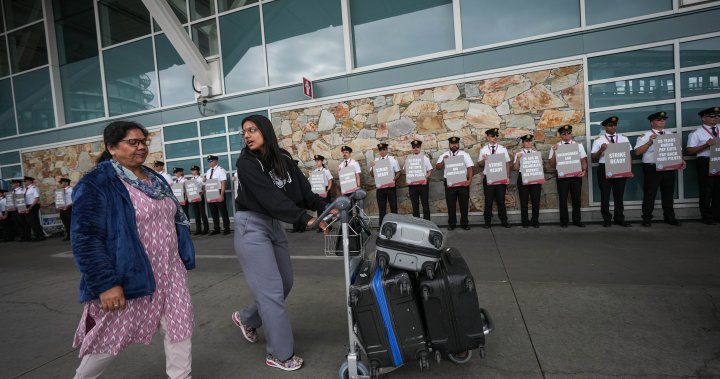Air Canada is facing the possibility of a strike by its 5,200 pilots represented by the Air Line Pilots Association (ALPA). The airline could start winding down operations and cancelling flights ahead of the strike deadline, unless a settlement is reached by Sunday. Both Air Canada and ALPA could issue a 72-hour lockout or strike notice, with operations expected to come to a halt by Wednesday, Sept. 18. The airline’s president and CEO, Michael Rousseau, emphasized the need to protect customers and prevent chaos caused by abrupt airline shutdowns.
Business, industry, and tourism groups have called on the federal government to intervene to avoid disruptions in air travel. The potential shutdown could affect 80% of Air Canada’s passengers, with an estimated 110,000 passengers impacted daily. Air Canada Express flights operated by third-party carriers Jazz and PAL Airlines will continue, but these regional partners only serve about 20% of Air Canada’s daily customers. ALPA has set up a “strike headquarters” near Toronto Pearson International Airport to support its members in case of a strike.
Last month, Air Canada pilots voted overwhelmingly in favor of a strike mandate if a new contract agreement is not reached. First Officer Charlene Hudy of the ALPA master executive council has urged Air Canada to negotiate seriously and come up with proposals to keep the airline competitive in the global aviation market. There have been calls for a fair deal and negotiations in good faith from both NDP Leader Jagmeet Singh and Conservative Leader Pierre Poilievre. Singh has stated that his party would not support back-to-work legislation, while Poilievre emphasized the importance of reaching a fair agreement.
If a strike or lockout notice is issued, Air Canada will begin an “orderly shutdown” of its operations. Former Air Canada chief operating officer, Duncan Dee, explained that the airline will start winding down operations by relocating aircraft closer to their bases and ensuring crews and mechanics are available to handle disruptions. Despite attempts to minimize the impact on travelers, the potential strike could lead to significant disruptions in air travel. The looming strike deadline has raised concerns among passengers, business groups, and government officials about the potential economic impact and disruption to air travel.
The situation is still developing, with negotiations ongoing between Air Canada and the pilots’ union. The possibility of a strike has highlighted the importance of reaching a mutual agreement to avoid widespread disruptions in air travel. The federal government has been urged to intervene in order to prevent chaos and protect the interests of passengers and the airline industry. As the deadline approaches, all parties involved are under pressure to find a resolution that is fair and acceptable to both the airline and its employees. The outcome of these negotiations will have significant implications for Air Canada, its customers, and the broader aviation sector in Canada.













